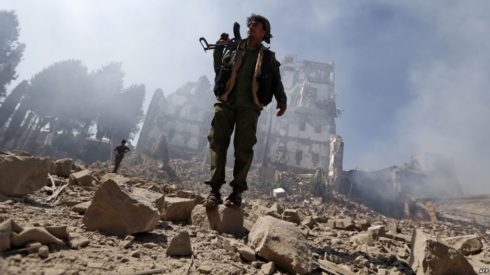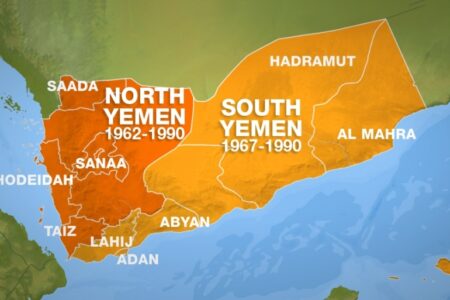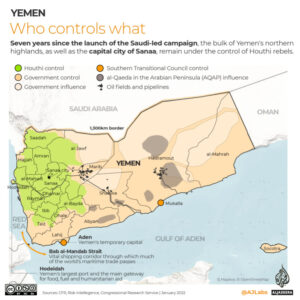
Houthi members inspect the damage after a reported airstrike carried out by the Saudi-led coalition targeted the presidential palace in the Yemeni capital Sana’a, Dec. 5, 2017.
Written by John Smith
In military history, the term “we learn from history, that we never learned from history” could be no truer than in Yemen. Two wars are raging in Yemen that the United States and the UK are complicit in: the first conflict has been a continuous counterterrorism battle against a Yemeni Al Qaeda’s affiliate, known as Al-Qaeda in the Arabian Peninsula (AQAP) and ISIS; the other is an intense civil war that has spread into other Middle East nations, initially Saudi Arabia but now also the United Arab Emirates.
How did we get to where we are today? Yemen’s history is complex but we can make it simple by bringing the person who is mainly responsible for what we have today, former Yemen President Ali Abdullah Saleh, who was killed in December 2017 during an ambush.
Ali Abdullah Saleh was the President of North Yemen, initially, and after the fall of the Soviet Union, he became the President of a unified Yemen. Although his country was awash in poverty, Saleh was accused of surpassing the greed of many other Middle Eastern authoritarian leaders by siphoning off vast sums of public money for himself and members of his family. Not only known for his greed, Saleh was also a political snake in using groups against each other to maintain his and his family’s personal power in Yemen, notably by supporting Sunni jihadist groups to do his dirty work.
As a result of 9/11, Saleh allied with the United States in the War on Terror but used this cooperation to shake down the US government of President George W. Bush to extort funds, which then became part of his personal financial stash. Saleh was no real ally of the United States as Hani Muhammad Mujahid, told Al Jazeera in a 2015 documentary Inside Al Qaeda that “many Al-Qaeda leaders were under the complete control of Ali Abdullah Saleh,” and that “Ali Abdullah Saleh turned Al-Qaeda into an organized criminal gang. He was not only playing with the West. He was playing with the entire world.”
In April of 2011, Saleh was facing large protests against his rule. This was during the “Arab Spring” protests that occurred throughout the Arab world. Saleh would initially agree to step down, but then renege and would attempt to return to power but then ultimately step down to allow Abdrabbuh Mansur Hadi to become the President of Yemen; who, currently to this day, is supported by Saudi Arabia as a puppet leader of part of Yemen.
Saleh in his typical role as a political snake, encouraged the Houthi invasion of Yemen spearheaded by Zaydi Houthi fighters under Saleh’s allegiance. The Houthis’ rise to power was aided by tribesmen and government soldiers loyal to Saleh. Saleh and the Houthis rebels formed a formal cooperation pact against the Saudi-led military alliance of the Hadi government. So, you can say Saleh helped get the Houthis to where they are today but this backfired when the Houthis determined that Saleh was making another deal with the Saudi-led military alliance, in order to return back to power. A spokesman for the Houthis, Mohamed Abdel Salam, said that three months prior to Saleh’s death, his organization had discovered communications between the UAE and Saleh. This betrayal ultimately led to the Houthis ambushing Saleh and killing him.
The reason we must spend so much time explaining Saleh is because he was the entire antagonist in this tragedy in Yemen. The West used Saleh, as they have used authoritarian leaders throughout the Arab world in the fictious “War on Terrorism” in order to keep US influence in the region prominent. The Houthis mainly rose up because the people of Yemen were basically tired of the tyrannical rule of Saleh and the Saudi and Emiratis were against any political movement that had any ties with the Islamic Republic of Iran; as the Houthis had.
Initially, General Officers within the US Pentagon advised not to attack the Houthis because the Houthis were fighting AQAP (Al Qaeda of the Arabian Peninsula) and IS-YP (Islamic State of the Yemeni Peninsula) and if the Houthis were forced to defend themselves against the Saudi led coalition, AQAP and IS-YP would gain substantial ground in Yemen and become a problem for the coalition forces in the future. However, President Obama did not listen to this advice and supported the UAE-Saudi led coalition against the Houthis and thereby created a Yemen that is basically divided into four parts: Western and Northern Yemen is Houthi controlled, the Southwestern part of Yemen is controlled by the Southern Transitional Council which is UAE backed, and parts of Middle Yemen and Eastern Yemen are controlled by the Saudi led Hadi government. The fourth part is the territory in the middle of Yemen controlled by AQAP and IS-YP. See the below map for a reference.
Had the Western governments, US and UK, plus the Saudis and Emiratis not got themselves involved in Yemen during the period of the Houthis uprising; you would at the worst scenario have seen a Houthi led Yemen or conservatively saw Yemen split once again, as it was before Saleh took over after the Unification of North Yemen and Southern Yemen. See the image below.

Source: AlJazeera
How do we end this conflict? The United States, UK and allies should stop all weapons sales and agreements with Saudi Arabia and the UAE if they do not end their military actions in Yemen and release the embargo that is in place against the Yemenis.
All U.S. and UK military troops and contractors should be removed from Yemen, along with UAE and Saudi troops and military contractors. This is the first step and should be non-negotiable. Additionally, any Iranian personnel should likewise be removed.
Secondarily, the United States, Iran, and UK should support the Houthis and STC in their ongoing efforts to control and eliminate AQAP and IS-YP. There should be a commitment financially to help rebuild Yemen’s infrastructure and economy without political interference by any outside parties, including the Islamic Republic of Iran.
Any military bases constructed by the UAE, Saudis, Israel, the US and UK should be dismantled and handed over either to the Houthis or STC, depending upon the location.
Damages to Yemen perpetrated by the US, UK, Saudi Arabia and the United Arab Emirates ought to be compensated directly to the National Unity government or to North and South Yemen as per pre-1990 boundaries.
Yemen needs a democratic process, supported by the UN, that begins making all sides in the crisis disarm their own militias. A Government of National Unity should be overseen by the UN, if possible, or else allow Yemen to split into North and South Yemen as per pre-1990 boundaries. If separated, the United Nations should assist each division in the formation of their own respective governments without the meddling of the West, GCC, Israel, or Iran.





Here is an article that looks at the very high cost of the war in Yemen on its civilian population:
https://viableopposition.blogspot.com/2022/02/the-high-human-cost-of-war-in-yemen.html
In large part, the blame for this suffering of Yemen’s civilians must be laid at the feet of the decision makers from both parties in Washington who repeatedly find themselves siding with Saudi Arabia, a nation well known for its human rights abuses. While this sort of behaviour is frequently used by Washington to justify military intervention, such is not the case with Saudi Arabia simply because the Saudi royal family controls the world’s most productive oil fields.
This writer portrays Russia’s wish on Yemen. Russia is trying to suppress a growing pan-Islamic movement across the Muslim world to rid those lands of foreign imperialism (Russia being the second biggest imperial nation after America). Note how the writer seems to support the Houthis, but then says Iran should keep off Yemen. The Houthis aren’t a fully ideological force like Hezbollah and others. That makes Houthis more tolerable by Russia. The STC are secularists. Ideological Sunni fighters are automatically labelled as Alqaeda or ISIS by Russia even if these fighters don’t know anything about Alqaeda. The terrorist designation by Russia is usually for groups opposed to Russia’s imperialistic views.
Unfortunately for the Russians, two big developments are picking pace against Russia:
First, Turkey has developed a cheap but effective weapon that governments can use to neutralize any Wagner-backed groups against a government. These Turkish weapons are continually being improved to stay ahead of any countermeasures. We’ve seen how Russia’s clients suffered severe loses in three wars already (Syria in March 2020, Nargono Kaharabakh in late 2020, Haftar in early 2020, and the Ethiopian separatists in late 2021). Where will the next Russian clients suffer? in the Donbas region I guess.
The second unfortunate development for Russia is Ukraine’s increasing cooperation with Turkey in the defense field. Turkey would have mastered the technology for fighter jets by 2030 with the help of Ukraine. Russia doesn’t want this. It could even be the main reason for this Russian move to invade Ukraine. All the NATO excuses are bullshit. Russia knows that Turkey is working on many bad-ass weapons and that Erdogan will approve sales of these weapons to Ukraine. Turkey is not NATO. In fact, NATO is a bigger threat to Turkey than Russia.
But even the warmongering Putin Knows that invading Ukraine will disrupt Russia’s imperial projects in other parts of the world, especially in Syria. It’ll also trigger unprecedented sanctions against Russia. China also opposes a Russian invasion of Ukraine though it condemns NATO’s moves around Russia.
The real target of this Russian aggression is Turkey. They are trying to prevent tech transfer to Turkey and also to prevent Turkey from building up Ukraine’s military to world standards.
Turkey lost in Idlib actually
A few notes and short explanations:
Yemen was united under a Zaydi government (the ruler was called Imam of Yemen for 11 centuries) until about 1960’s. They became a vassal to the Ottoman empire in mid 18th century and after its dissolution Yemen gained independence in the 1930’s. Later (’60s) there was a coup which led to a civil war and breaking up of the country, so historically it wasn’t 2 separate countries with a natural border created and solidified over time.
Saleh became the north Yemen (Yemen Arab Republic) in late ’70s and later in ’90 became the president of Republic of Yemen (whole Yemen) till 2011. BTW, the Yemeni unification happened before the dissolution of the USSR, not as a result of it (does the author’s info come from his 34 years of experience?)
You may know the rest, how Saleh was overthrew, the elections for a transitional government, how Hadi with backing of Saudis refused to step down as his term as transitional president finished, his resignation, his regret, his resignation again, going to Saudis and regretting yet again and the invasion. But the invasion wasn’t done by Houthis (how can you invade your own land, stupid?) as our informed author says, it was done from the outside and continues to this day. Houthis are a relatively small tribe (or family) in Yemen, there are larger tribes but the movement, “Ansarallah” is a national movement and not limited to one tribe.
In regard to the role the AQAP and ISIS plays in this invasion, well it’s well documented that the coalition of terror (Saudis and Emiratis backed by US) are supporting, arming, funding, training and moving them to where they need them. There was numerous instances for example in the battle of Ma’rib, where AQ and ISIS fought along and among the coalition mercenaries while the coalition planes bombed Yemeni army and popular committee positions.
As for author’s “peace plan”. It is exactly the same thing that Yemenis are fighting against: breakup of their country and fall of Yemeni coasts, strategic islands and the Bab-alMendeb into the hands of the Empire. He proposes a pretty picture where invaders leave Yemen and says Iranian forces also have to leave. Well, one problem boy: Where to find Iranian forces in Yemen to begin with? Then with this “peace plan” the Empire gets what they couldn’t get with war and murder of hundreds of thousands of Yemenis. It’s not a new plan oozing from our author’s genius, it’s been proposed years ago and brought forward now when it’s clear that the US-backed petty dictators find it hard to continue the killings.
I’ll gladly add the name of this propagandist to Dorsey to avoid their rubbish, and the next “author” which I’m sure will arrive shortly.
It’s been a few good years here but I think I have to find another place for my ravings.
Any recommendations?
In fact, you are correct here but you support different groups.
When Yemen was divided there was civil wars. Iran, both Shahist and Islamist, supported North Yemen always. Egypt and Sudan also supported North Yemen. Iraq, Saudi Arabia, Syria and Oman used to support South Yemen because Saudi Arabia and Oman didn’t want a strong unified Yemen.
Now the tables have turned. Saudi Arabia, Egypt and Sudan support Hadi but Egypt and Sudan want to pull out. Iran supports the Houthis. Oman supports Mehri nationalists and secretly the Houthis. Qatar supports Muslim Brotherhood and secretly the Houthis. UAE supports the STC only.
There are also other forces that are mostly neutral but fall to one side. Syria and Iraq fall to the Houthi side while Morocco and Jordan fall to the Hadi side.
Other forces like Turkey, Pakistan or Ethiopia are truly neutral but if Iran is clever they will bring them in their alliance to break apart Arab nations and to eye Israel in the end.
Very correct article. Saleh was an opportunist like Assad. Assad, during the Lebanese civil war was against Hezbollah but now they support them.
On the other hand, we have the radical islamic militias. Not only the most radicals like AQ or ISIS but groups like Houthis or Muslim Brotherhood.
Arab coalition doesn’t have the same aims. Saudi Arabia wants Hadi. UAE wants STC. Oman wants Mehri nationalists. Qatar wants Muslim Brotherhood.